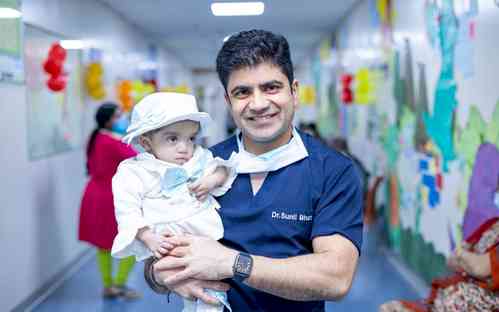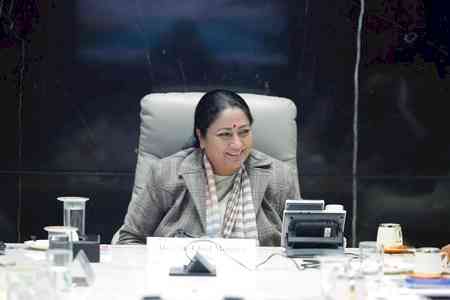Pakistani baby girl with rare osteopetrosis finds cure at Bengaluru hospital
A five-month-old baby girl from Pakistan, who was diagnosed with the rare and life-threatening condition infantile osteopetrosis, is going back home with a new lease of life after doctors here at a private hospital treated her with an innovative bone marrow transplant technique.

Bengaluru, Sep 20 (IANS) A five-month-old baby girl from Pakistan, who was diagnosed with the rare and life-threatening condition infantile osteopetrosis, is going back home with a new lease of life after doctors here at a private hospital treated her with an innovative bone marrow transplant technique.
Infantile osteoporosis, often referred to as "marble bone disease," poses severe challenges, including bone stiffness, progressive loss of vision and hearing, and bone marrow complications, ultimately leading to a shortened life expectancy.
Baby Samawiya was born to a Karachi-based couple after a decade of waiting. She was just two months old when her parents took her to hospital in Pakistan due to feeding difficulties, where they discovered that she was suffering from a genetic condition.
Her condition impacted her eyes, ears, and even her brain, necessitating a series of intricate procedures, for which her parents reached out to doctors at Narayana Health City in Bengaluru.
Upon her evaluation in March, this year, Samawiyah displayed mild visual impairment, prompting an urgent cranial decompression procedure to safeguard her eyesight. Subsequently, she underwent a meticulous pre-transplant preparation and received a half-match donor transplant using her father's stem cells on May 16.
A bone marrow transplant offers hope for a cure, but with significant risks of rejection and complications. Thus, the doctors used the innovative TCR Alpha Beta and CD 45 RA depletion technique. The cutting-edge method, tailored for patients without full match donors, has shown remarkable success.
"Infantile osteopetrosis is a rare genetic disease leading to dense bones, vision impairment and blindness, hearing impairment, bone marrow failure etc. It is fatal within a few years of life. Only curative option is bone marrow transplant which is technically very challenging and hence prognosis remains grim," Sunil Bhat, Vice Chairman of Oncology and Director and Head of Paediatric Hematology Oncology and BMT at Narayana Health City, told IANS.
"After over four months post-transplantation, Samawiyah is declared free from infantile osteoporosis, with 100 per cent donor cells in her blood," said the doctors in a statement.
Her journey to recovery is underway, and her bone remodelling is progressing positively.
"We now hope that she's going to be like any other normal child and is cured of this very rare but dreaded disease," Bhat said.
"I am profoundly thankful to the doctors for their expertise and the genuine care they extended to my daughter. They not only provided us with medical solutions but also became our extended family during these trying times," said Junaid Ali, baby Samawiyah's father.



 IANS
IANS 










